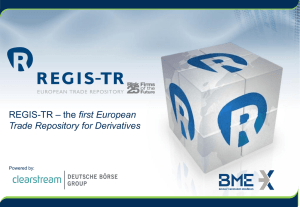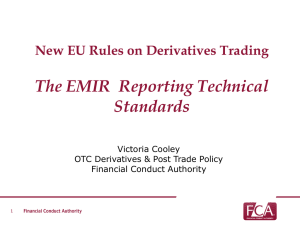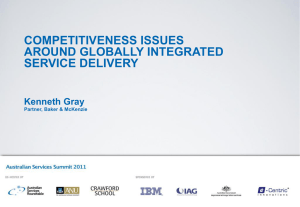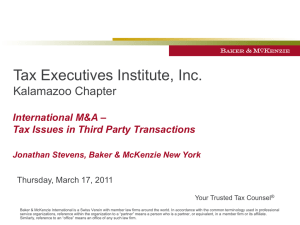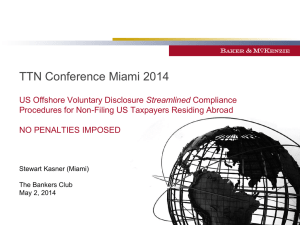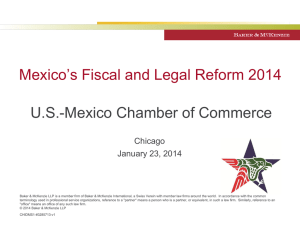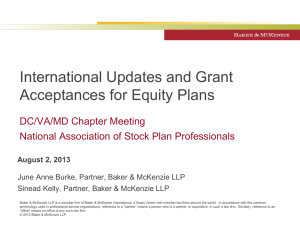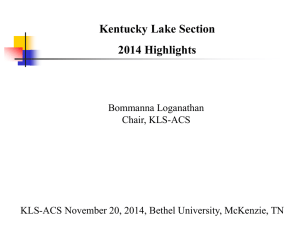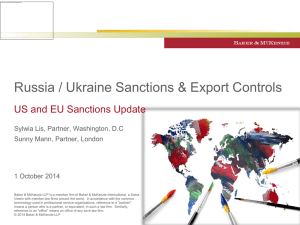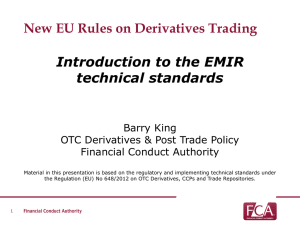Baker & McKenzie Presentation Slides
advertisement
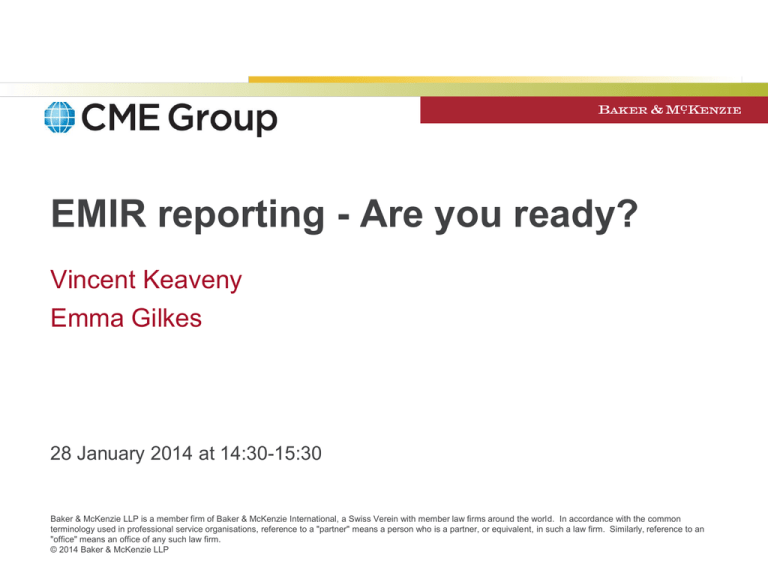
EMIR reporting - Are you ready? Vincent Keaveny Emma Gilkes 28 January 2014 at 14:30-15:30 Baker & McKenzie LLP is a member firm of Baker & McKenzie International, a Swiss Verein with member law firms around the world. In accordance with the common terminology used in professional service organisations, reference to a "partner" means a person who is a partner, or equivalent, in such a law firm. Similarly, reference to an "office" means an office of any such law firm. © 2014 Baker & McKenzie LLP Overview – Background and Objectives of EMIR – EMIR Implementation timetable – What is the “Reporting Obligation”? – How does EMIR define “derivatives”? – Who does EMIR Reporting Obligation apply to? – What needs to be reported? © 2014 Baker & McKenzie LLP 2 Background and Objectives of EMIR – – To increase transparency (especially with respect to prices and volumes) by requiring: reporting of information to trade repositories (accessible to regulators); Publication by trade repositories of aggregate positions by class (which would be accessible to all market participants). To reduce counterparty credit risk by imposing: mandatory clearing of standardised OTC derivatives; capital and collateral requirements for CCPs (for cleared trades); risk mitigation (for non-cleared trades). – To reduce operational risk by requiring the use of electronic means for trade confirmations. © 2014 Baker & McKenzie LLP 3 EMIR Implementation timetable 15 Mar 2013 15 Sep 2013 Risk mitigation for OTC derivatives: Timely confirmation and daily valuation requirements (FC and NFC+) in force; Obligation on NFCs to report to ESMA and competent authority if exceed clearing threshold FCs monthly report unconfirmed OTC derivatives outstanding > 5 business days Risk mitigation for OTC derivatives: Requirements for portfolio reconciliation, portfolio compression and dispute resolution enter into force FCs required to report any disputes about OTC derivative, its valuatioon or exchange of collateral > €15 million and outstanding > 15 business days Reporting start date for each asset class for which a Trade Repository is authorised: commodities, credit, foreign exchange, equity, interest rates and others both OTC and exchange traded Applies to all new derivative contracts Backloading requirement: All derivatives entered into on or after 16 August 2012 onwards that are still outstanding 12 Feb 2014 13 May 2014 Backloading requirement: derivatives entered into before 16 August 2012 which were still outstanding on 12 February 2014 Q1 2014 First CCPs likely to be authorised Summer 2014 ESMA to submit draft RTS on the clearing obligation 12 August 2014 Trade reporting will include requirement to report on mark-to-market/ mark-to-model and information on collateral (FC and NFC+ only) H2 2014 Expect ESMA RTS on margin for non-cleared OTC derivatives trades. (Impact FC and NFC+ only) Backloading requirement: derivatives entered into before 16 August 2012 but which were no longer outstanding on 16 August 2012 12 February 2017 © 2014 Baker & McKenzie LLP 4 What is the “Reporting Obligation”? – – – Financial counterparties, non-financial counterparties and CCPs are required to report to a trade repository the details of any derivative contract which is concluded, modified or terminated (including any derivative with a pension fund or intra-group). The report is to be made no later than the working day following the conclusion, modification or termination of the relevant derivative contract. The Reporting Obligation covers both cleared and non-cleared derivatives and applies to derivative contracts: – entered into before 16 August 2012 (i.e. EMIR came into force) but which were outstanding on that date; and entered into on or after 16 August 2012. Delegated reporting is permitted, liability remains with party with reporting obligation © 2014 Baker & McKenzie LLP 5 How does EMIR define “derivatives”? – EMIR uses the same definition of “derivatives” as set out in MiFID and therefore covers: – – cash and physically settled financial derivatives; cash settled commodity derivatives; physically settled commodity derivatives traded on a regulated market or a multilateral trading facility; physically settled commodity derivatives having characteristics of financial derivatives provided not being for commercial purposes NB does not include spot FX but will include rolling spot FX Forward FX for commercial purposes © 2014 Baker & McKenzie LLP 6 Who does EMIR Reporting Obligation apply to? – – The Reporting Obligation applies to counterparties and CCPs ESMA Q&A: only counterparties established in EU i.e. “financial counterparties” and “non-financial counterparties”. What is a “financial counterparty”? – A “financial counterparty” is any investment firm, credit institution, insurance, assurance or reinsurance undertaking, UCITS or UCITS manager, institution of occupational retirement provision or an alternative investment fund managed by an alternative investment fund manager (each as authorised under relevant European Directive). What is a “non-financial counterparty”? – A “non-financial counterparty” is any undertaking established in the EU that is not a “financial counterparty”. © 2014 Baker & McKenzie LLP 7 What needs to be reported? – ESMA “pro-forma” reports identifying the fields that will need to be completed by counterparties for the purposes of satisfying the Reporting Obligation – Counterparty Data - Information to be reported with respect to the counterparty includes: – 85 fields – Counterparty Data (x26) and Common Data (x59) parties to the contract; whether the counterparty is a financial or non-financial counterparty; whether the clearing threshold has been exceeded by the non-financial counterparty; and name of the reporting entity (where the counterparty has delegated the reporting obligation) mark-to-market/mark-to model and collateral details (Aug 2014 FC and NFC+ only) Common Data - Information to be reported with respect to the derivative contract itself includes: type of derivative contract; maturity; notional value; price, and settlement date. © 2014 Baker & McKenzie LLP 8 EMIR reporting - Are you ready? Vincent Keaveny - Partner Baker & McKenzie LLP Structured Capital Markets Emma Gilkes - Senior Associate Baker & McKenzie LLP Structured Capital Markets This Webcast is for information purposes only. Its contents do not constitute legal advice and should not be regarded as detailed advice in individual cases. This may qualify as "Attorney Advertising" requiring notice in some jurisdictions. Baker & McKenzie LLP is a member firm of Baker & McKenzie International, a Swiss Verein with member law firms around the world. In accordance with the common terminology used in professional service organisations, reference to a "partner" means a person who is a partner, or equivalent, in such a law firm. Similarly, reference to an "office" means an office of any such law firm. © 2014 Baker & McKenzie LLP
